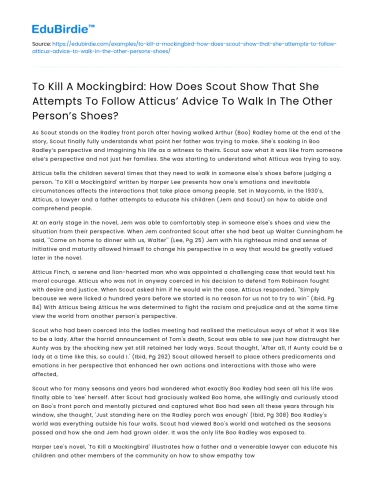As Scout stands on the Radley front porch after having walked Arthur (Boo) Radley home at the end of the story, Scout finally fully understands what point her father was trying to make. She's soaking in Boo Radley’s perspective and imagining his life as a witness to theirs. Scout saw what it was like from someone else’s perspective and not just her families. She was starting to understand what Atticus was trying to say.
Atticus tells the children several times that they need to walk in someone else's shoes before judging a person. 'To Kill a Mockingbird' written by Harper Lee presents how one's emotions and inevitable circumstances affects the interactions that take place among people. Set in Maycomb, in the 1930's, Atticus, a lawyer and a father attempts to educate his children (Jem and Scout) on how to abide and comprehend people.
Save your time!
We can take care of your essay
- Proper editing and formatting
- Free revision, title page, and bibliography
- Flexible prices and money-back guarantee
At an early stage in the novel, Jem was able to comfortably step in someone else's shoes and view the situation from their perspective. When Jem confronted Scout after she had beat up Walter Cunningham he said, ''Come on home to dinner with us, Walter'' (Lee, Pg 25) Jem with his righteous mind and sense of initiative and maturity allowed himself to change his perspective in a way that would be greatly valued later in the novel.
Atticus Finch, a serene and lion-hearted man who was appointed a challenging case that would test his moral courage. Atticus who was not in anyway coerced in his decision to defend Tom Robinson fought with desire and justice. When Scout asked him if he would win the case, Atticus responded, ''Simply because we were licked a hundred years before we started is no reason for us not to try to win'' (Ibid, Pg 84) With Atticus being Atticus he was determined to fight the racism and prejudice and at the same time view the world from another person's perspective.
Scout who had been coerced into the ladies meeting had realised the meticulous ways of what it was like to be a lady. After the horrid announcement of Tom's death, Scout was able to see just how distraught her Aunty was by the shocking new yet still retained her lady ways. Scout thought, 'After all, If Aunty could be a lady at a time like this, so could I.' (Ibid, Pg 262) Scout allowed herself to place others predicaments and emotions in her perspective that enhanced her own actions and interactions with those who were affected,
Scout who for many seasons and years had wondered what exactly Boo Radley had seen all his life was finally able to 'see' herself. After Scout had graciously walked Boo home, she willingly and curiously stood on Boo's front porch and mentally pictured and captured what Boo had seen all these years through his window, she thought, 'Just standing here on the Radley porch was enough' (Ibid, Pg 308) Boo Radley's world was everything outside his four walls. Scout had viewed Boo's world and watched as the seasons passed and how she and Jem had grown older. It was the only life Boo Radley was exposed to.
Harper Lee's novel, 'To Kill a Mockingbird' illustrates how a father and a venerable lawyer can educate his children and other members of the community on how to show empathy towards others. Atticus Finch, the backbone of 'To Kill a Mockingbird' was able to encourage and influence others into showing compassion by his own courage employed to battle and persevere against the existence of prejudice and racism in Maycomb County.






 Stuck on your essay?
Stuck on your essay?

